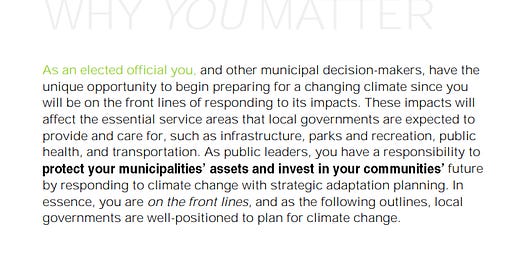ICLEI's "Leadership & Legacy" Handbook: What Your Council Needs to Know
Wake-Up Call for Canadian Municipal Leaders
After carefully reviewing ICLEI Canada's "Leadership & Legacy" Handbook for Local Elected Officials on Climate Change, we are compelled to sound the alarm. Beneath the polished language of “climate leadership” lies a roadmap for embedding UN-driven policy into municipal law—without consent, cost transparency, or jurisdictional legitimacy.
This handbook rebrands elected officials as "climate champions," pushes international policy under the guise of local planning, and quietly shifts the financial and legal burden of global net-zero infrastructure onto municipal taxpayers. And while nothing in the handbook is mandatory, the expectations are massive—and the price tag could reach into the trillions nationally.
Here’s what we found:
1. Role Confusion: Councillors as Advocates, Not Representatives
The handbook encourages elected officials to act as “champions” of climate action, subtly shifting their role from representative of constituents to enforcer of global climate goals. This can blur the line between advocacy and democratic responsibility.
2. Global Directives Masquerading as Local Policy
Municipalities are instructed to embed climate action into asset management, budgeting, procurement, and official planning documents—tools of long-term legal and financial authority. These changes lock in global objectives at the local level with little public debate or understanding of their international origins.
3. Municipalities Left Holding the Bill
The handbook recommends emissions tracking, staff training, community engagement, and long-term planning—all of which require substantial municipal funding. While ICLEI avoids terms like “mandate,” the cumulative effect is a soft obligation to comply—with municipalities footing the bill.
4. Administrative Bypass of Public Oversight
Staff are described as the central drivers of climate action. Councils are encouraged to support staff with resources and authority. This shifts climate policy away from elected decision-making and into administrative channels, where public consent and scrutiny are reduced.
5. No Disclosure of ICLEI’s Global Ties
The handbook presents ICLEI as a technical support organization but omits its UN affiliations, its Agenda 2030 alignment, and its ties to international frameworks. This lack of transparency is misleading—especially when global policies are being implemented locally.
6. It’s Not a Municipal Responsibility
ICLEI’s recommendations blur jurisdictional lines by encouraging municipalities to act on climate regulation, energy infrastructure, and emissions targets—issues that lie outside local authority. Downloading these responsibilities onto municipalities creates unrealistic expectations and financial liabilities.
This handbook is not a guide—it’s a political Trojan horse.
It invites municipalities to pay for, staff, and enforce an international agenda that will transform local governance and spending priorities for decades to come. Councils need to understand: your residents didn’t vote for this, and you don’t have to comply.
📣 What’s happening in your town? Have you seen ICLEI-style language in your budget, OCP, or asset plans?
Please share your feedback. We want to hear from municipal reps, residents, and staff who see what’s happening.
Reply directly or email us at info@kiclei.ca.
In service of local governance,
Maggie Braun
National Coordinator, KICLEI Canada






Hi I was a monthly donor, but had to cancel my credit card due to fradulent activity and therefore your donations have ceased. I have tried to update my card info but cannot find anyway to do so. If you wish yo continue receiving my $10/month donation please contact me so I can reset the info.
Herma
519-719-3581